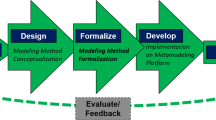Abstract
Conceptual Modeling was a marginal research topic at the very fringes of Computer Science in the 60s and 70s, when the discipline was dominated by topics focusing on programs, systems and hardware architectures. Over the years, however, the field has moved to centre stage and has come to claim a central role both in Computer Science research and practice in diverse areas, such as Software Engineering, Databases, Information Systems, the Semantic Web, Business Process Management, Service-Oriented Computing, Multi-Agent Systems, Knowledge Management, and more. The transformation was greatly aided by the adoption of standards in modeling languages (e.g., UML), and model-based methodologies (e.g., Model-Driven Architectures) by the Object Management Group (OMG) and other standards organizations. We briefly review the history of the field over the past 40 years, focusing on the evolution of key ideas. We then note some open challenges and report on-going research, covering topics such as the representation of variability in conceptual models, capturing model intentions, and models of laws.
Notes: A keynote with a similar title was given 12 years ago at CAiSE’97, hence the ”part II”. The research presented in the talk was conducted jointly with colleagues at the Universities of Toronto (Canada) and Trento (Italy).
Similar content being viewed by others
Author information
Authors and Affiliations
Editor information
Editors and Affiliations
Rights and permissions
Copyright information
© 2009 Springer-Verlag Berlin Heidelberg
About this paper
Cite this paper
Mylopoulos, J. (2009). Conceptual Modeling in the Time of the Revolution: Part II. In: Laender, A.H.F., Castano, S., Dayal, U., Casati, F., de Oliveira, J.P.M. (eds) Conceptual Modeling - ER 2009. ER 2009. Lecture Notes in Computer Science, vol 5829. Springer, Berlin, Heidelberg. https://doi.org/10.1007/978-3-642-04840-1_3
Download citation
DOI: https://doi.org/10.1007/978-3-642-04840-1_3
Publisher Name: Springer, Berlin, Heidelberg
Print ISBN: 978-3-642-04839-5
Online ISBN: 978-3-642-04840-1
eBook Packages: Computer ScienceComputer Science (R0)




